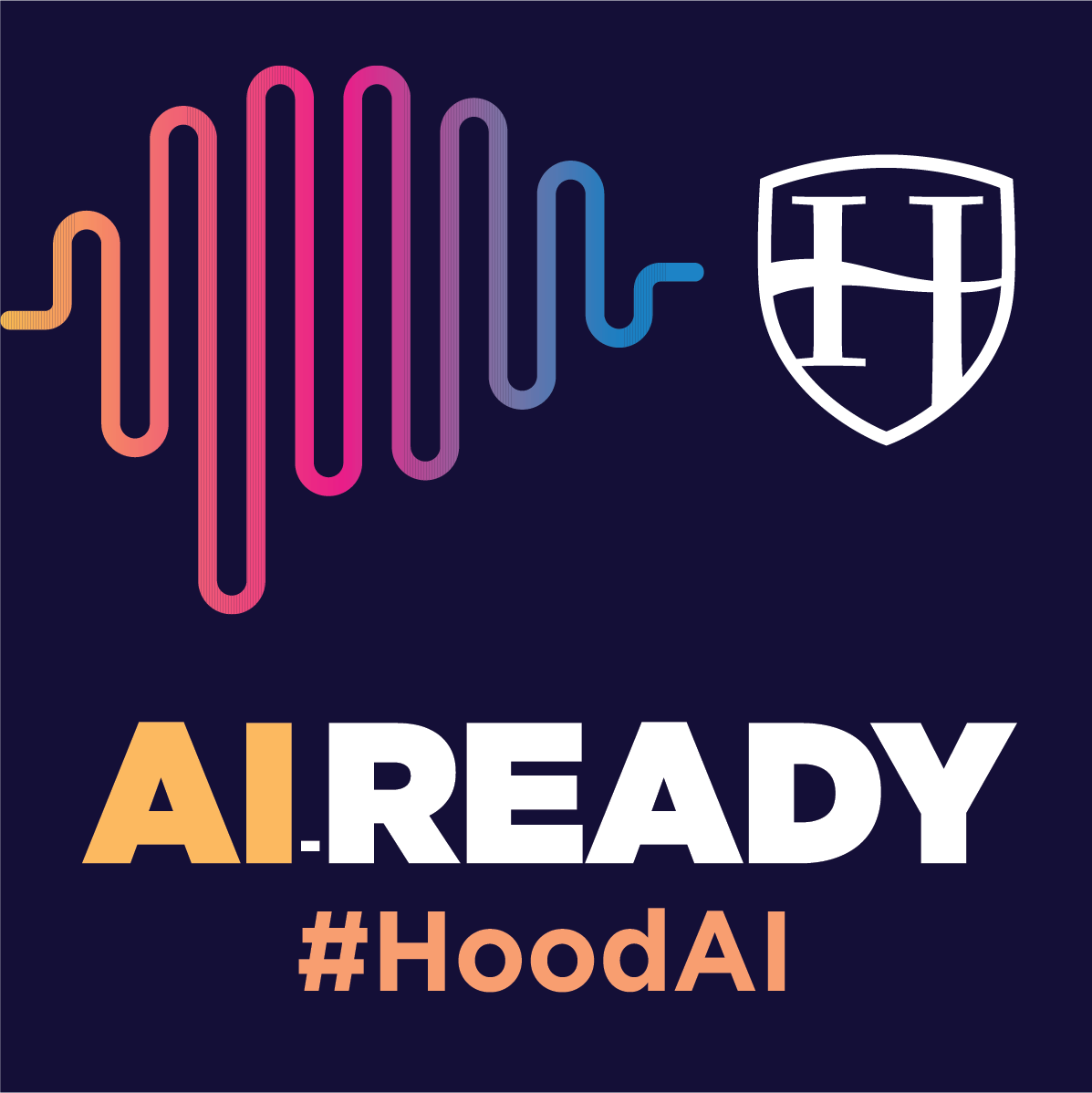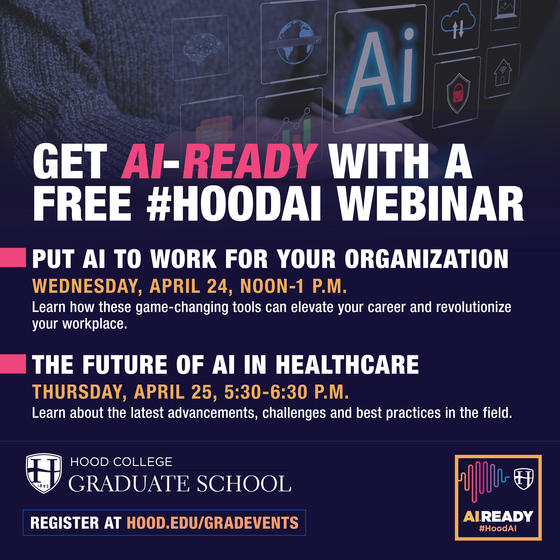
Graduate Student Spotlight | Haley Greene
"I think everyone should have a basic understanding of business analytics because whatever field you are in, you will need to be able to make some kind of organizational plan."

Welcome to Hood College, where innovation meets education at the forefront of artificial intelligence (AI). As technology continues to reshape the world around us, Hood remains committed to staying ahead of the curve. With a dedicated team of faculty experts leading the charge, we’re not just keeping pace with AI research—we’re setting the standard.

At Hood College, AI isn’t just a buzzword; it’s a cornerstone of our academic programs and research initiatives. Our faculty members are passionate educators and esteemed researchers, who actively contribute to advancements in AI across various disciplines.
From machine learning to natural language processing, our faculty experts are at the forefront of cutting-edge AI research. Their work shapes the future of technology and enriches the educational experience of our students, providing them with invaluable insights and opportunities to engage with the latest developments in the field.
Join us at Hood College and discover how we’re harnessing the power of AI to drive innovation, empower students and create a brighter future for generations to come.
Click below for article on the Benefits & Risks of AI in the Fall 2024 edition of Hood Magazine

Read below for recent Hood College news features about AI:
The Use of Generative Artificial Intelligence (AI)
The Graduate School recognizes the evolving landscape of generative artificial intelligence (AI) tools and their increasing use in higher education. Certain uses of such tools may be suitable to support and enhance scholarly activities in certain disciplines or in specific courses, assignments and projects. At the same time, there are significant unresolved legal and ethical considerations about the use of these tools with respect to privacy, copyright, authorship and intellectual property that have direct academic integrity implications. Faculty and students are expected to maintain the highest standards of academic integrity and transparency in all scholarly activities, whether generative AI tools are used or not. Decisions, attribution and any guidance regarding the use of such AI tools rest with the course instructor and may vary according to the course activity within the context of a given discipline. Failure to comply with course AI policies/allowances, which includes improper citation, will result in consequences outlined in the Violations of Academic Conduct policy.

From machine learning to natural language processing, our faculty experts are at the forefront of cutting-edge AI research. Here are a few of our faculty experts engaged in AI with their research, teaching and consulting endeavors:
The Skill Accelerators program offers a unique series of non-degree professional development badges.
Digital badges are short, focused, competency-based credentials that provide in-demand skills, knowledge and experience. The Skill Accelerators program is designed for working professionals seeking to upskill and advance their careers without committing to the demands of a full graduate degree. Most badges are offered online for convenience and flexibility.
We offer badges in several focus areas, including business, computing, counseling and trauma, equity and inclusion, biotechnology and education. Topics range from finance, human resources, AI and data analytics, diversity in education and much more. Badges are offered at foundational, intermediate and advanced levels, and any badge can be applied toward a future master’s degree.
Summer 2024 Generative AI Business Badge
Now enrolling! Our focused online course is designed to be affordable, accessible and flexible. Upskill your AI proficiency and become a leader in the tech-driven future. You will be introduced to key AI concepts from generative frameworks to data analytics. Explore the frontiers of AI with industry professionals, starting with the basics and progressing to expert-level strategies and cutting-edge applications for business.
Apply by June 30.
Summer I 2024
CS 498H: SpTpc: Deep Learning
Prerequisite: CS 219 or Permission of Instructor The course introduces the fields of artificial neural network based machine learning with applications in computer vision and natural language processing. Deep learning is behind many recent advances in artificial intelligence, including speech recognition and self-driving cars. Students will work on big data projects using cloud resources from fastest supercomputers in the world.
ITMG 599C: Special Topic: Introduction to AI in Business
This course offers an introductory yet hands-on track in Artificial Intelligence (AI) tailored for students specializing in Information Technology and Information Systems. It aims to equip students with the necessary skills to pursue careers in business AI. Throughout the course, students will be acquainted with various AI principles, including machine learning and deep learning, AI ethics, an array of machine learning algorithms, and natural language processing (NLP), such as Chat Bots as customer service. They will investigate real-world AI applications within the business sector and engage in practical labs and research endeavors to observe AI in use.
Summer II 2024
ITMG 599B: SpTpc: Applied Generative AI
Prerequisite: A basic understanding of AI concepts and familiarity with business domains. Programming experience is not required. This course explores the strategic application of generative artificial intelligence (AI) in driving innovation and value creation across business domains. Students will learn to leverage generative AI techniques to solve real- world problems and optimize processes within organizations. The course covers the theoretical underpinnings of generative AI, including key concepts and techniques such as GANs, VAEs, and Transformer-based models. Students will dive into practical applications using the WINS framework (Words, Images, Numbers, and Sounds) across diverse domains like healthcare, government, marketing, and finance. Through lectures, case studies, hands-on exercises, and a culminating project on creating a custom Language Model (LLM), students will gain a strong understanding of strategically implementing and managing generative AI solutions while considering ethical implications and future trends.
Fall 2024
CS 428: Artificial Intelligence
Prerequisite: Junior standing and CS 219 or permission of the instructor. History, fundamental principles, and future directions of A.I. Topics include state-space searching, knowledge representation, logic and deduction, natural language processing, neural networks, learning, vision, robotics, and cognitive science. Topics will be treated at a level of depth and detail appropriate for a first course in AI.
CS 528: Artificial Intelligence
Prerequisite: A minimum grade of “B-” in CSIT 512 or permission of the instructor. History, fundamental principles, and future directions of A.I. Topics include state-space searching, knowledge representation, logic and deduction, natural language processing, neural networks, learning, vision, robotics, and cognitive science. Topics will be treated at a level of depth and detail appropriate for a first course in AI.
Put AI to Work For Your Organization
April 24, 2024 | 12 p.m. to 1 p.m.
Learn how these game changing tools can elevate your career and revolutionize your workplace.
View recorded event here.
The Future of AI in Healthcare
April 25, 2024 | 5:30 p.m. to 6:30 p.m.
Learn about the latest advancements, challenges, and best practices in the healthcare field.
View recorded event here.
HOOD TALKS - AI in Healthcare - From Promise to Practice
September 25, 2025 | 12:00 p.m. to 1:00 p.m.
Learn about current and future applications of AI that improve patient care and complement clinicians' work.
View recorded event here.
We are the LIMFAC Navigating an AI Centered Future
October 15, 2025
Learn about how the rapidly evolving landscape of AI has far-reaching implications across industries, from defense to healthcare and beyond.
View recorded event here.
HOOD TALKS - The Impact of AI on Science
February 5, 2026 | 12:00 p.m. to 1:00 p.m.
Learn about current and future applications of AI in biological research.
View recorded event here.

"I think everyone should have a basic understanding of business analytics because whatever field you are in, you will need to be able to make some kind of organizational plan."

"I decided to teach at Hood College because I was impressed by the College's vision and commitment to provide quality education in the field of health informatics. Hood is one of the few institutions that recognized the need and potential of this emerging discipline, which combines information technology, healthcare and data science to improve health outcomes and reduce costs."
Daniel Sierra-Sosa is an assistant professor in the Department of Computer Science and Information Technology at Hood College.
He has been involved in multiple activities related to industry research and other partner academics. Dr. Sierra-Sosa engages in industrial initiatives with Kindred-Healthcare, which works on research projects in the development of mobile applications, virtual reality, medical images and predictive analysis.
He is the co-author and lead author of several manuscripts that have been published in recognized journals. Prof. Sierra-Sosa is also a Qiskit Advocate and instructor at IBM Skills Academy in Quantum Computing, Data Science and Artificial Intelligence.
